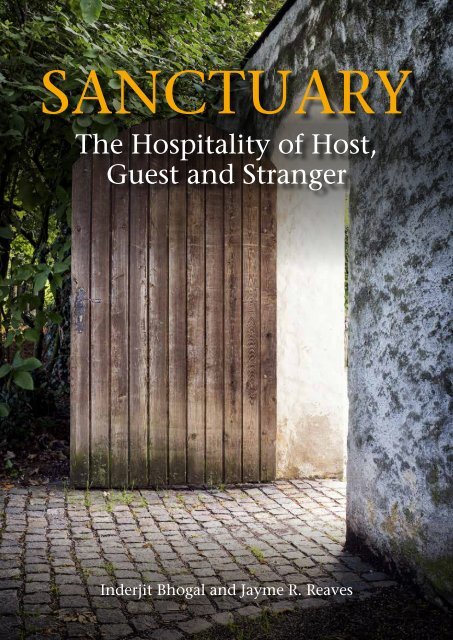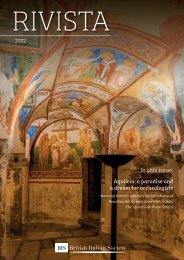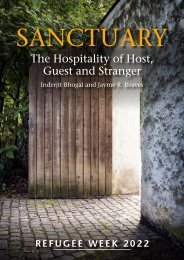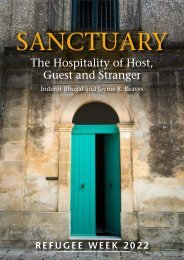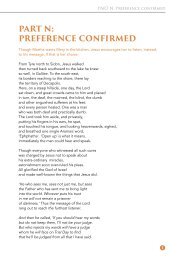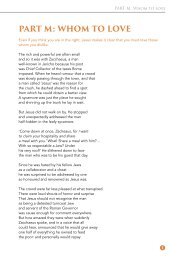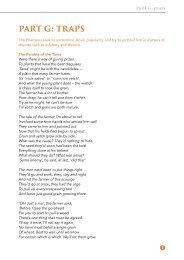Sanctuary Bible Study_converted_PROOF_03
You also want an ePaper? Increase the reach of your titles
YUMPU automatically turns print PDFs into web optimized ePapers that Google loves.
SANCTUARY<br />
The Hospitality of Host,<br />
Guest and Stranger<br />
Inderjit Bhogal and Jayme R. Reaves<br />
<strong>Sanctuary</strong>: The Hospitality of Host, Guest and Stranger 1
Unless otherwise stated, Scripture quotations are<br />
taken from the New Revised Standard Version<br />
<strong>Bible</strong>: Anglicised Edition, copyright © 1989,<br />
1995 the Division of Christian Education of the<br />
National Council of the Churches of Christ in the<br />
United States of America. Used by permission. All<br />
rights reserved.<br />
Scripture quotations marked ‘GNT’ are from the<br />
Good News <strong>Bible</strong> © 1994 published by the <strong>Bible</strong><br />
Societies/HarperCollins Publishers Ltd UK, Good<br />
News <strong>Bible</strong>© American <strong>Bible</strong> Society 1966, 1971,<br />
1976, 1992. Used with permission.<br />
Published by Churches Together<br />
in Britain and Ireland<br />
Interchurch House<br />
35 Lower Marsh<br />
London SE1 7RL<br />
+44 (0) 20 3794 2288 (phone)<br />
info@ctbi.org.uk<br />
www.ctbi.org.uk<br />
Registered charity no. 1113299 (England & Wales)<br />
Company limited by guarantee, registered no. 5661787<br />
© CTBI 2022
Foreword<br />
It is an ancient tradition across the world that holy places are considered<br />
places of sanctuary for those at risk of persecution. In the Christian faith<br />
this principle is enshrined in Scripture and given powerful expression<br />
in the ministry of Christ and the disciples of the early Church, who sought<br />
hospitality as they journeyed to share the Good News in dangerous times.<br />
This resource aims to support individual Christians, church communities<br />
and ecumenical groups in reflecting on the significance of sanctuary for<br />
our times. The Sunday at the end of the week is designated as <strong>Sanctuary</strong><br />
Sunday to give expression through prayer and witness to the centrality of<br />
sanctuary and hospitality to the stranger in the Christian call to love our<br />
neighbours. At its heart, this work is about connecting people, locally and<br />
globally, with respect for the dignity of every human person as made in<br />
the image and likeness of God.<br />
On behalf of all at CTBI, I would like to thank Revd Dr Inderjit Bhogal for<br />
his inspiring and generous leadership in this area, which continues to bear<br />
fruit in the increasing number of churches making the commitment to<br />
become a Church of <strong>Sanctuary</strong> so that they might serve as that beacon of<br />
hope for those in need of shelter and community. I would also like to thank<br />
Dr Jayme Reaves, who alongside Inderjit, played a pivotal role in the writing<br />
of this new resource.<br />
Dr Nicola Brady,<br />
General Secretary,<br />
Churches Together in Britain and Ireland
For further reflection and action there are resources<br />
available on the Churches Together in Britain and<br />
Ireland’s Church of <strong>Sanctuary</strong> website:<br />
www.churchofsanctuary.org<br />
4 <strong>Sanctuary</strong>: The Hospitality of Host, Guest and Stranger
Introduction<br />
According to the United Nations High Commissioner for Refugees (UNHCR), around 90% of<br />
the world’s refugees come from countries in or close to war and conflict, and almost<br />
90% of all refugees live in countries neighbouring their country of origin.<br />
Wars make refugees. In the long term, the only solution to the unprecedented numbers of<br />
refugees in the world is the cessation of war and conflict, and a world without war. This is the<br />
clear lesson from the current Russia–Ukraine conflict.<br />
In international law there is no “illegal” or “bogus” asylum seeker. Anyone has the right to<br />
apply for asylum in any country that has signed the 1951 UN Refugee Convention, and to<br />
remain there until authorities have assessed their claim. Plans to relocate asylum seekers to<br />
another country are hostile; they penalise already humiliated people, and also contravene<br />
international law.<br />
The criterion for determining refugee status is fleeing danger and seeking safety, not the means<br />
of travel or routes taken, not ethnicity, not the colour of skin, not nationality. All refugees have<br />
to be treated equally. Can Christians who hold to the promise of the Kingdom of God accept<br />
a situation where people’s human rights, and human dignity, are deemed to disappear at a<br />
border?<br />
Jesus’ followers turn to his story about the Good Samaritan (Luke 10:29-37), where a man<br />
despised for his faith offered compassion and care for a wounded man. The story illustrates<br />
how compassion is not restricted by borders and identity.<br />
Biblical witness carries a call for the protection and safety of people whose lives are in danger<br />
while their case is processed (Numbers 35). God called on Moses to set up cities of refuge to<br />
ensure this. In this wisdom is the root of the contemporary movement and network of City of<br />
<strong>Sanctuary</strong>, which has led to the development of the Church of <strong>Sanctuary</strong> work.<br />
<strong>Sanctuary</strong> is built on protective safety, and it challenges hostility with hospitality. In all human<br />
faith and practice, hospitality is the established way of handling difference and transcending<br />
borders and barriers, and expressing respect for the worth of people, especially those<br />
considered to be least worthy and most excluded.<br />
A Church of <strong>Sanctuary</strong> will respond to refugees on the basis of fact not fiction, hospitality not<br />
hostility, and will do this as integral to Christian discipleship.<br />
This resource offers reflections, prayers and ideas for action to explore issues around Church<br />
of <strong>Sanctuary</strong>. I am extremely grateful to my friend and colleague, Dr Jayme Reaves, for her<br />
sterling contributions in co-writing this resource.<br />
May God, our refuge and shelter, who takes sanctuary in us, strengthen our resolve to be people of<br />
sanctuary, that we might build cultures of welcome and hospitality and act with protective care for all<br />
who are in need of sanctuary. We pray for a world without war in which all can live safely and without<br />
fear in their own homes.<br />
Inderjit Bhogal<br />
<strong>Sanctuary</strong>: The Hospitality of Host, Guest and Stranger 5
“I was a stranger and you<br />
welcomed me...”<br />
[Matthew 25:35]<br />
6 <strong>Sanctuary</strong>: The Hospitality of Host, Guest and Stranger
DAY ONE:<br />
God Takes <strong>Sanctuary</strong><br />
<strong>Bible</strong> Passages for Reflection<br />
Exodus 25:8<br />
Have them make me a sanctuary, so that I may dwell among them.<br />
John 1:14<br />
And the Word became flesh and lived among us.<br />
Revelation 3:20<br />
I am standing at the door, knocking; if you … open the door,<br />
I will come in to you and eat with you, and you with me.<br />
Reflection on the Passages<br />
The <strong>Bible</strong> places God at the centre of all creation (Genesis 1). Heaven and heaven’s heaven<br />
cannot confine God (1 Kings 8:27). Yet God asks for sanctuary (Exodus 25:8). This is an<br />
astonishing request.<br />
In John 1:14 the Good News disclosed in Jesus is summarised in this way:<br />
And the Word became flesh and lived among us.<br />
The Greek word translated as “lived” has its root in a word meaning “tent”, a word used also for<br />
the “Tabernacle” where the Ark of the Covenant was housed. It is a word used by Peter on the<br />
Mount of Transfiguration when he says, “I will make three dwellings here” (Matthew 17:4; see<br />
also, for example, Hebrews 8:5; 9:1, 21; 11:9).<br />
The “Tabernacle” was the portable sanctuary constructed at Sinai and primarily associated with<br />
the wanderings of the Hebrew people in the wilderness. It was the sacred space where God was<br />
considered to dwell among people.<br />
The first one for whom sanctuary must be provided is God. God is revealed and encountered in<br />
sanctuary.<br />
This sanctuary for God was not a house, not a mansion, not even a stable, or anything solid and<br />
permanent. It was mobile, and it represented the mobility of the travelling God accompanying<br />
a travelling people in all their journeying.<br />
The Nativity stories reveal God taking sanctuary among people with the vulnerability and<br />
dependency of a child.<br />
<strong>Sanctuary</strong>: The Hospitality of Host, Guest and Stranger 7
The first requirement, for the birth of Christ, is a sanctuary, to make a little<br />
room challenging the idea that there was “no room” (Luke 2:7, GNT).<br />
Not long after Jesus’ birth, Mary and Joseph are said to flee with their child<br />
to Egypt as refugees seeking sanctuary (Matthew 2:13-15).<br />
The stories surrounding Jesus and the early Church, in Luke and Acts,<br />
continue the theme of journey. An illuminating story tells of the encounter<br />
with the risen Christ who meets and walks with his friends as a “stranger”<br />
on the road to Emmaus, how he becomes their guest, and how he also<br />
takes up the role of host and is revealed in the breaking of the bread (Luke<br />
24:13-35).<br />
The image of Jesus standing at the door, knocking, is traditionally seen as<br />
Jesus knocking on the door of a soul. Can we see here an image of someone<br />
knocking for sanctuary, and see the face of Christ in them?<br />
Questions for Further Reflection<br />
What do we learn from God’s request for sanctuary?<br />
Where do you discern God asking you for sanctuary?<br />
Where do you see the face of Christ “standing at the door,<br />
knocking”?<br />
Suggested Action<br />
Write a short story outlining the situation faced by Mary,<br />
Joseph and the infant Jesus when seeking sanctuary. Then<br />
turn to recent stories from the news of people displaced by<br />
conflict, climate breakdown or natural disasters. Where do<br />
you see parallels with the story you have written?<br />
Prayer<br />
Holy God, you are my soul’s shelter. In you is my refuge and my<br />
eternal resting place. In all my wanderings you bring me to my<br />
own door and welcome me there, and nourish me.<br />
Amen.<br />
8 <strong>Sanctuary</strong>: The Hospitality of Host, Guest and Stranger
DAY TWO:<br />
Protective Hospitality<br />
<strong>Bible</strong> Passages for Reflection<br />
Leviticus 19:33-34<br />
When an alien resides with you in your land, you shall not oppress the alien.<br />
The alien who resides with you shall be to you as the citizen among you; you<br />
shall love the alien as yourself, for you were aliens in the land of Egypt: I am<br />
the Lord your God.<br />
Luke 10:25-28<br />
Just then a lawyer stood up to test Jesus. “Teacher,” he said, “what must I do<br />
to inherit eternal life?” He said to him, “What is written in the law? What<br />
do you read there?” He answered, “You shall love the Lord your God with all<br />
your heart, and with all your soul, and with all your strength, and with all<br />
your mind; and your neighbour as yourself.” And he said to him, “You have<br />
given the right answer; do this, and you will live.”<br />
John 15:12-14<br />
This is my commandment, that you love one another as I have loved you. No<br />
one has greater love than this, to lay down one’s life for one’s friends. You are<br />
my friends if you do what I command you.<br />
Reflection on the Passages<br />
In Luke’s Gospel, Jesus gives a sermon by telling the story of the Good Samaritan to explore<br />
the question of who is our neighbour. Thousands of pages have been spent on this parable,<br />
but ultimately what we take away from it is that our neighbour is the one in need, the one we<br />
are not necessarily prepared for, the one whose life and well-being are at stake. We are called<br />
to take responsibility for them, to offer a safe place to recuperate, and to put our own needs<br />
on a par with theirs. Jesus’ story teaches us that hospitality is not just about welcoming those<br />
we know and love, but also about providing protection and sanctuary to those who have been<br />
threatened, abused and neglected.<br />
This is not something we can afford to be naïve about: the provision of protective hospitality<br />
is risky to both the guest and the host. We are all connected to one another. To protect and<br />
defend our own interests to the detriment of another’s life and well-being is not what loving<br />
our neighbour entails. Jesus’ words in John 15 tell us that we are to love others as he has<br />
loved us: to be prepared to put ourselves at risk for others. Our lives are worth no more, and<br />
no less, than our neighbours’ lives.<br />
<strong>Sanctuary</strong>: The Hospitality of Host, Guest and Stranger 9
Questions for Further Reflection<br />
Put yourself in the shoes of someone who has been forced to abandon<br />
their home and life as they knew it in one place and flee to another in<br />
search of safety.<br />
What must it feel like?<br />
What needs would you have in that situation?<br />
How would you want someone to respond?<br />
Suggested Action<br />
Get in touch with an organisation such as City of <strong>Sanctuary</strong>,<br />
Refugees at Home or the resettlement programme at your<br />
local council to see how you can get involved in providing<br />
sanctuary for refugees in your community.<br />
Celebrate the contributions of refugees and people seeking<br />
sanctuary.<br />
Find ways of demonstrating solidarity with those displaced<br />
and seeking sanctuary.<br />
Prayer<br />
Welcoming God, who is our refuge in times of trouble, you call<br />
us to be your ambassadors, to reflect your own character and to<br />
love our neighbours. Help us to grow in our capacity to provide<br />
hospitality, care and responsibility toward those who are in need<br />
of sanctuary.<br />
Amen.<br />
10 <strong>Sanctuary</strong>: The Hospitality of Host, Guest and Stranger
DAY THREE:<br />
The Gifts Others Bring<br />
<strong>Bible</strong> Passages for Reflection<br />
Genesis 2:18<br />
Then the Lord God said, “It is not good that the man should be alone; I will<br />
make him a helper as his partner.”<br />
Hebrews 13:1-2<br />
Let mutual love continue. Do not neglect to show hospitality to strangers, for<br />
by doing that some have entertained angels without knowing it.<br />
Reflection on the Passages<br />
Hospitality is deeply connected to reciprocity and mutuality, and we never know what<br />
unexpected gifts (and challenges) it may bring as a result. We know that we are not created to<br />
be alone, but instead to be in community. We welcome others not only because God tells us<br />
to, but also because we don’t know when we might be in need sometime in the future and,<br />
naturally, we would want someone to do the same for us. Yesterday’s passage in Leviticus 19<br />
reminds us that we are to welcome others because we were once strangers too and we should<br />
know how it feels.<br />
Often when we talk about hospitality, we talk about feeding people or welcoming them into<br />
our space, which assumes we are talking about hospitality only from the host’s perspective.<br />
But what about the guest? In what ways might the guest reciprocate and offer us hospitality in<br />
return? In the practice of hospitality, the most meaningful and transformative experiences are<br />
when the guest becomes host and the host becomes guest. We know each other when we can<br />
empathise, put ourselves in each other’s position and share in each other’s experiences.<br />
If you are just feeding people in need, that is charity (which is good), but it is not hospitality as<br />
it offers no space for mutuality and reciprocity. Guests must be given space to host as well: to<br />
offer a story, to get to know the host, to ask questions, to contribute to the meal or offer a gift in<br />
whatever form it takes. The gift may simply be a relationship or an experience that enables the<br />
host to open up and see the world through the guest’s eyes.<br />
<strong>Sanctuary</strong>: The Hospitality of Host, Guest and Stranger 11
Questions for Further Reflection<br />
Why do we often find it easier to be a host than to be a<br />
guest?<br />
What vulnerabilities are there in being a host? What<br />
vulnerabilities are there in being a guest?<br />
What gifts does being a host bring? What gifts does being a<br />
guest bring?<br />
Suggested Action<br />
If you customarily are a host, consider looking for<br />
opportunities to be a guest; likewise, if you are customarily a<br />
guest, consider looking for opportunities to be a host. Listen<br />
to stories of those seeking sanctuary. Reflect on what you<br />
have learned in order to strengthen your hospitable practice.<br />
Prayer<br />
Welcoming God, who became a guest in this world in the life<br />
of Jesus and who hosts us at the everlasting table, help us to<br />
recognise the gifts others bring when we gather and share life<br />
together.<br />
Amen.<br />
12 <strong>Sanctuary</strong>: The Hospitality of Host, Guest and Stranger
DAY FOUR:<br />
Cities of Refuge<br />
<strong>Bible</strong> Passages for Reflection<br />
Deuteronomy 19:7-10<br />
Therefore I command you: You shall set apart three cities.<br />
If the Lord your God enlarges your territory, as he swore to your ancestors –<br />
and he will give you all the land that he promised your ancestors to give you,<br />
provided you diligently observe this entire commandment that I command<br />
you today, by loving the Lord your God and walking always in his ways<br />
– then you shall add three more cities to these three, so that the blood of<br />
an innocent person may not be shed in the land that the Lord your God is<br />
giving you as an inheritance, thereby bringing blood-guilt upon you.<br />
Numbers 35:9-12<br />
The Lord spoke to Moses, saying: Speak to the Israelites, and say to them:<br />
When you cross the Jordan into the land of Canaan, then you shall select<br />
cities to be cities of refuge for you, so that a slayer who kills a person without<br />
intent may flee there. The cities shall be for you a refuge from the avenger, so<br />
that the slayer may not die until there is a trial before the congregation.<br />
Reflection on the Passages<br />
There are several texts in the Hebrew <strong>Bible</strong> that describe what are called “cities of refuge”,<br />
places that are set aside to which people who are under threat can flee and find protection.<br />
In the legal texts of Numbers and Deuteronomy, the details related to these sanctuaries<br />
are quite precise: they are to be within equal distance to each other with roads to enable<br />
quick travel; they need to be administered by the Levites (the priestly class); and the person<br />
who is seeking sanctuary will remain safe from threat while residing in the city. There is a<br />
context here of manslaughter – unintentional killing of another person – that causes one to<br />
assume blood-guilt for which family members could exact retributive justice. However, more<br />
importantly, the issue is ensuring safety for those who are fleeing danger until their case can<br />
be heard and justice offered.<br />
In the Deuteronomy passage, there is a direct relationship drawn between providing refuge and<br />
being righteous – “by loving the Lord your God and walking always in his ways” – and also that<br />
the land is sacred, given as an inheritance to us by God. It is our responsibility to keep from<br />
polluting the land with innocent blood and the scourge of violence. Therefore, putting a legal<br />
system in place to ensure innocent lives were protected was deemed important as a means of<br />
limiting violence and preserving life.<br />
<strong>Sanctuary</strong>: The Hospitality of Host, Guest and Stranger 13
It is from this tradition that the idea of taking sanctuary in holy places<br />
such as churches arose. While there are equivalents in other traditions, in<br />
Christian history, those who were seeking safety from threat expected to<br />
find refuge in a church or monastery. As long as they remained in the space,<br />
they were protected.<br />
Questions for Further Reflection<br />
What is it about these texts that provoke your imagination<br />
and offer inspiration for providing refuge in your<br />
community?<br />
What would it take for your church, town/city or nation to<br />
become a place of refuge?<br />
Suggested Action<br />
Based on your answer above about what it would take for<br />
your community (local or nationally) to become a place of<br />
refuge, join with others to discuss an action plan. What will<br />
it take? What measures need to be put in place? Who else is<br />
doing this work nearby from whom you can learn?<br />
Prayer<br />
Welcoming God, who delivers us and gives us refuge, teach us what it<br />
means to love you and to walk in your ways by loving the strangers in<br />
our midst who are in need of protection.<br />
Amen.<br />
14 <strong>Sanctuary</strong>: The Hospitality of Host, Guest and Stranger
DAY FIVE:<br />
Becoming a Church/<br />
Meeting of <strong>Sanctuary</strong>,<br />
Revitalising an<br />
Ancient Tradition<br />
<strong>Bible</strong> Passages for Reflection<br />
Leviticus 19:34<br />
The alien who resides with you shall be to you as the citizen among you; you<br />
shall love the alien as yourself, for you were aliens in the land of Egypt: I am<br />
the Lord your God.<br />
Matthew 25:35<br />
I was a stranger and you welcomed me.<br />
Matthew 10:40<br />
Whoever welcomes me welcomes the one who sent me.<br />
Reflection on the Passages<br />
The idea of sanctuary and hospitality is valued in all faiths and cultures. The goal of building<br />
good community remains incomplete without the integration of all people, especially those<br />
whose lives are most in danger (including children, women, older people, victims of human<br />
trafficking, refugees and asylum seekers).<br />
The <strong>Bible</strong> contains the command to “love your neighbour as yourself”. Yet this commandment<br />
is stated only once in the Hebrew Scriptures (Leviticus 19:18). The most repeated ethical<br />
requirement in Hebrew Scripture is the challenge to love the stranger (see, for example,<br />
Leviticus 19:34).<br />
A neighbour is someone who is a bit like ourselves. A stranger is someone very different.<br />
The <strong>Bible</strong> challenges us to love the stranger, who is, after all, a pilgrim on a shared journey.<br />
The <strong>Bible</strong> calls us to encounter God and the face of Christ in the stranger, in someone who is<br />
different.<br />
In New Testament teaching, Jesus says that he is welcomed as we welcome the stranger. Jesus<br />
said, “Whoever welcomes me welcomes the one who sent me” (Matthew 10:40). This is a<br />
development of the theme of giving sanctuary to God.<br />
<strong>Sanctuary</strong>: The Hospitality of Host, Guest and Stranger 15
Cities of refuge were about giving protection to people whose lives were in<br />
danger. The contemporary idea of a City of <strong>Sanctuary</strong> is a development of<br />
the ancient wisdom of the concept of cities of refuge.<br />
The concept of cities of refuge may also have been influenced by the<br />
Bedouin practice of nazaala or “the taking of refuge”. It goes deep into<br />
ancient North African and Middle Eastern wisdom. It is reflected in the story<br />
of Abraham and Sarah offering shelter and hospitality to passing strangers<br />
in the heat of the day “by the Oaks of Mamre”, where their tent was<br />
(Genesis 18:1-8).<br />
Imagine your congregation as a community of sanctuary, as a Church of<br />
<strong>Sanctuary</strong> building on the idea of city of refuge and City of <strong>Sanctuary</strong>.<br />
A Church of <strong>Sanctuary</strong> goes beyond welcome to build hospitality and to<br />
challenge hatred. The Church of <strong>Sanctuary</strong> works by three steps, as noted<br />
below, involving the whole congregation to work together:<br />
Learn about what it means to be seeking sanctuary, and be actively involved<br />
in awareness raising.<br />
Embed – take positive action to make welcome and inclusion part of<br />
the values of your congregation or community to support those seeking<br />
sanctuary and refuge, and to include them in your activities.<br />
Share with pride your vision and achievements: let others know about<br />
the positive contribution refugees make to society and the benefits of a<br />
welcoming culture for everyone.<br />
Involve people seeking sanctuary and refugees in helping you to progress<br />
and achieve these principles.<br />
When you feel you are ready, you can apply for recognition as a Church/<br />
Place/Meeting of <strong>Sanctuary</strong>. Application forms are not complex or<br />
cumbersome, and are available from City of <strong>Sanctuary</strong>: see: https://<br />
churchofsanctuary.org/.<br />
A group of churches in a parish/circuit becoming recognised Churches of<br />
<strong>Sanctuary</strong> can agree together to be known as a Parish/Circuit of <strong>Sanctuary</strong>.<br />
There is an old reflection of hospitality from the island of Ireland in these<br />
words:<br />
We saw a stranger yesterday.<br />
We put food in the eating place,<br />
Drink in the drinking place,<br />
Music in the listening place,<br />
And with the sacred Name of the triune God,<br />
He blessed us and our house,<br />
Our cattle and our dear ones,<br />
As the Lark says in her song,<br />
Often, often, often goes the Christ,<br />
In the stranger’s guise.<br />
(The Gaelic Rune of Hospitality, from the Carmen Gadelica)<br />
16 <strong>Sanctuary</strong>: The Hospitality of Host, Guest and Stranger
An old Celtic proverb reads, “It is in the shelter of each other that the<br />
people live.”<br />
There is a human, legal, moral and spiritual obligation on us all to provide<br />
safety and sanctuary to each other, and especially to those whose lives are<br />
in danger. This is important and urgent in our times of open hostility and<br />
hatred particularly towards people from other countries seeking security and<br />
sanctuary among us. In contexts of isolation, it is important to do all we can<br />
to keep people connected, and to ensure no one feels alone.<br />
All people can be vulnerable at certain times in their lives, especially in<br />
communities that intentionally set out, like churches, to be welcoming to<br />
all and to be inclusive. It is essential in churches to be proactive in building<br />
safeguards and promoting cultures of safeguarding and environments of<br />
safety for all.<br />
Questions for Further Reflection<br />
What does it mean to provide a place of sanctuary, and to<br />
ensure that all among us are safe from harm?<br />
In what ways, despite our best intentions, may we<br />
inadvertently do harm, or allow harm to be done to those<br />
who take sanctuary among us?<br />
What safeguards and training do we need to make<br />
available?<br />
Suggested Action<br />
Learn about what it means to be a Church of <strong>Sanctuary</strong>. Use<br />
the Churches Together in Britain and Ireland’s “Hospitality<br />
and <strong>Sanctuary</strong> for All” resource (ctbi.org.uk/hospitalityand-sanctuary-for-all)<br />
and the Church of <strong>Sanctuary</strong> website<br />
(churchofsanctuary.org/church-of-sanctuary).<br />
Prayer<br />
Holy God, we pray for all who are far from home. Strengthen us<br />
to build churches of hospitality and sanctuary for all.<br />
Amen.<br />
<strong>Sanctuary</strong>: The Hospitality of Host, Guest and Stranger 17
18 <strong>Sanctuary</strong>: The Hospitality of Host, Guest and Stranger
DAY SIX:<br />
Hospitality And Holiness<br />
<strong>Bible</strong> Passages for Reflection<br />
John 2:21<br />
Jesus was speaking of the temple of his body.<br />
Reflection on the Passages<br />
Where God is honoured, holiness is centred on the presence of God. The dwelling place of God<br />
is holy and is called a “sanctuary” (Exodus 25:8) or “temple” (John 2:19-21).<br />
The association of holiness and sanctuary is a universal concept, and goes back thousands of<br />
years. It is enshrined in humanity all around the world, religious and non-religious. It is an idea<br />
that is common to all ethnicities and unites us. All the major world faiths accord centrality to<br />
holiness.<br />
Biblically, holiness is associated with protection from harm, and with the provision of healing.<br />
People go to holy places to pray for protection from harm, and for well-being.<br />
The word “sanctuary” is derived from the Latin word sanctarium, a container of holy things to<br />
be protected with dignity and respect.<br />
In Christian usage, the term “sanctuary” has come to refer particularly to the altar and the<br />
area surrounding it. This is considered especially sacred because it is most associated with the<br />
presence of God as symbolised, for example, in the sacraments of the Word and Holy Eucharist.<br />
In many Asian contexts, shoes and socks have to be removed before entering the sanctuary.<br />
<strong>Sanctuary</strong> is any sacred space or spot others should not invade or intrude into, and certainly not<br />
with violence.<br />
Many sacred shrines and places of worship have been built on spots associated with a miracle<br />
or martyrdom, or with a particular man or woman of God. St Albans Cathedral is built where<br />
Alban, the first Christian martyr in Britain, was killed for sheltering and protecting a refugee.<br />
The idea that a persecuted or endangered person should be protected is part of all human<br />
culture, wisdom and behaviour from ancient times. First Nations People and Native Americans<br />
provided sanctuary to those in danger during the invasions of the Spanish, the English and the<br />
French.<br />
In India, every place of worship enshrines safety, especially of those in need, including travellers<br />
from afar. This can be traced back to the days of the ancient Indus Valley civilisation when<br />
travellers began to go across the waters of the Indus.<br />
<strong>Sanctuary</strong>: The Hospitality of Host, Guest and Stranger 19
Hospitality is not a soft practice. In cultures of hostility, hospitality offers<br />
a positive and countercultural practice. It is a better way to respond to<br />
difference, transcending social borders and expressing respect especially for<br />
people some consider to be the least important. When people considered<br />
unwelcome are shown hospitality and affirmed as people who also have<br />
much to give, we see the sacred nature of hospitality.<br />
Hospitality that projects the power of the giver over against the recipient is<br />
patronising. True hospitality is an expression of solidarity, a hospitality of<br />
mutuality and equality, which affirms all participants as made in the image<br />
of God, and as equal, with much to give and receive.<br />
Questions for Reflection<br />
What human qualities do you relate to holiness? Where do<br />
you see these qualities reflected?<br />
How do you/can you express holiness in daily life?<br />
What makes building sanctuary an act of holiness?<br />
Suggested Action<br />
Visit and explore places deemed to be holy. What<br />
illumination do your journeys to these places offer to the<br />
idea of sanctuary?<br />
Prayer<br />
Holy God, holy is your name, holy is your way. Let your holiness<br />
be reflected in my living and being.<br />
Amen.<br />
20 <strong>Sanctuary</strong>: The Hospitality of Host, Guest and Stranger
DAY SEVEN:<br />
Worship and Prayer<br />
<strong>Bible</strong> Passage<br />
Psalm 139:1-14<br />
Prayer of approach and confession<br />
Blessed are you, Holy God.<br />
You are Creator, and you make each one of us beautiful and blessed,<br />
In your image and likeness.<br />
You are our refuge.<br />
You take sanctuary in us.<br />
You call each one of us by name.<br />
You know all our hopes and desires.<br />
You know all our aches and pains.<br />
You know the journeys we take.<br />
Your presence surrounds us like a sanctuary.<br />
Holy is your name.<br />
Holy are your ways.<br />
We bless you<br />
For all you give in Jesus Christ.<br />
In him you have shown the world new ways of living and loving.<br />
We bless you<br />
For all you give us in your Spirit,<br />
New understandings of your Word and wisdom,<br />
Strength to live by each day.<br />
Holy God, forgive us<br />
For all the ways in which we and others assault and abuse your image in us, in others,<br />
and in all your creation around us.<br />
Forgive us<br />
That our living and loving and sharing<br />
So often betrays the living and loving and sharing of Jesus that we profess.<br />
Forgive us<br />
For our failure to offer welcome and hospitality to the stranger.<br />
Forgive us for turning away from your wisdom,<br />
And for imagining we can live in our own strength.<br />
As we pray and read from the Scriptures and meditate on them;<br />
As we renew our commitments to you again<br />
And resolve to live by the principle of welcome and hospitality,<br />
Grant us the assurance again<br />
That you forgive us.<br />
Heal us and strengthen us<br />
That we may worship you well, and live, love and serve<br />
To your praise and glory.<br />
In the name of Christ.<br />
Amen.<br />
<strong>Sanctuary</strong>: The Hospitality of Host, Guest and Stranger 21
Short time of silence for reflection. Use a <strong>Bible</strong> reading that has been<br />
illuminating for you.<br />
<strong>Sanctuary</strong> Prayer<br />
I pray to you, Holy God, for the Church of Christ throughout the world, that<br />
we shall be blessed by your grace, and that all will be given strength to bear<br />
witness to the grace of God in mission and ministry, worship and prayer.<br />
I pray to you, Holy God, for all nations and all leaders, that you will<br />
illuminate within and before them the pathways made of justice, mercy and<br />
humility for all to walk, and to build peace and healing.<br />
I pray to you, Holy God, for all who need help and support today, especially<br />
those I hold up before you [people can be named], that your grace will be on<br />
them and that you will bless them. And I pray for all those who provide care.<br />
I pray to you, Holy God, for all who are far from home, for prisoners,<br />
immigrants, exiles, refugees and all who seek sanctuary, that you will be<br />
the shelter of their lives and souls. Help me, and all I work with, to build<br />
communities of welcome, hospitality and sanctuary for all.<br />
I pray to you, Holy God, that I may be sanctuary, and be given the grace<br />
to follow Christ and to practise his art of hospitality and welcome to the<br />
stranger. Help me to love those who hate me so that together we can make<br />
the world a better place.<br />
I hold with thanks before you, Holy God, those who have died for justice,<br />
for they have brought us new life, and those whose memory is precious to<br />
us. Grant them peace. Give strength to all who are bereaved. Bless all who<br />
mourn the loss of their homes and livelihoods. And grant us wisdom and<br />
encouragement from the vision, witness and example of all the saints who<br />
have gone before us.<br />
In the name of Christ.<br />
Amen.<br />
Lord’s Prayer<br />
Our Father in heaven,<br />
hallowed be your name,<br />
your kingdom come,<br />
your will be done,<br />
on earth as in heaven.<br />
Give us today our daily bread.<br />
Forgive us our sins<br />
as we forgive those who sin against us.<br />
Lead us not into temptation<br />
but deliver us from evil.<br />
For the kingdom, the power,<br />
and the glory are yours<br />
now and for ever.<br />
Amen.<br />
22 <strong>Sanctuary</strong>: The Hospitality of Host, Guest and Stranger
The sentences below can be used as a closing affirmation.<br />
Litany of Justice<br />
Reader:<br />
All:<br />
Reader:<br />
All:<br />
Reader:<br />
All:<br />
Reader:<br />
All:<br />
Reader:<br />
All:<br />
Reader:<br />
All:<br />
Reader:<br />
All:<br />
Jesus said, “I was hungry and you gave me food.” Made in the<br />
image of God,<br />
We see the face of Christ in all.<br />
Jesus said, “I was thirsty and you gave me something to drink.”<br />
Made in the image of God,<br />
We see the face of Christ in all.<br />
Jesus said, “I was a stranger and you welcomed me.” Made in<br />
the image of God,<br />
We see the face of Christ in all.<br />
Jesus said, “I was naked and you gave me clothing.” Made in<br />
the image of God,<br />
We see the face of Christ in all.<br />
Jesus said, “I was sick and you took care of me.” Made in the<br />
image of God,<br />
We see the face of Christ in all.<br />
Jesus said, “I was in prison and you visited me.” Made in the<br />
image of God,<br />
We see the face of Christ in all.<br />
Jesus said, “In as much as you did to one of those considered to<br />
be the least important, you did it to me.” Made in the image of<br />
God,<br />
We see the face of Christ in all. We go from here to see and serve<br />
Christ in all.<br />
Amen.<br />
<strong>Sanctuary</strong>: The Hospitality of Host, Guest and Stranger 23


